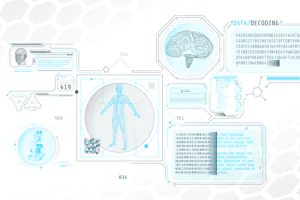What Can You Do With a Master's in Bioinformatics?
Published March 1, 2024
 Bioinformatics is a dynamic field at the crossroads of biology, computer science, and data analytics that harnesses the power of technology to decipher complex biological information.
Bioinformatics is a dynamic field at the crossroads of biology, computer science, and data analytics that harnesses the power of technology to decipher complex biological information.
Curious about what you can do with a master’s degree in bioinformatics? Read on to learn more about this field, including job prospects and career paths you can pursue with a master’s degree.
What is Bioinformatics?
Bioinformatics uses advanced algorithms and computational tools to fuel scientific discovery. It is essential in all areas of biotechnology, including personalized medicine, genetic engineering, evolutionary biology, and agriculture. Some important subdisciplines include genomics, transcriptomics, and proteomics, which focus on the DNA, RNA, and proteins of an organism. Our ability to predict the structure of proteins is advancing rapidly, which will revolutionize drug discovery.
Future Job Prospects in Bioinformatics
The demand for bioinformatics professionals is already strong and predicted to grow as industries increasingly rely on data-driven insights and as bioinformatics propels advancements in medicine and science.
Competitiveness of the Bioinformatics Industry
As the job market in bioinformatics grows, a master’s degree can help you become a more competitive candidate in your chosen career. In this competitive arena, a combination of education, skills, and proactive engagement is the key to standing out. Not only can a graduate degree program give you the education you need—it can provide the networking and hands-on lab experience essential to career advancement.
What Can I Do With a Masters in Bioinformatics?
Bioinformatics offers a range of specializations across a broad spectrum of career avenues. Computational genomics involves decoding DNA sequences for medical insights, while structural bioinformatics focuses on understanding protein structures.
The specialized knowledge you’ll gain from a master’s degree program can help guide you toward a fulfilling career.
Fields Related to Bioinformatics
There is a need for bioinformatics specialists in a variety of fields in the public, private, and non-profit sectors. Fields directly related to bioinformatics include:
- Medical Sciences
- Pharmaceuticals
- Biotechnology
- Software Development
- Bioengineering
- Consulting
- Computational Chemistry
- Paleogenomics
What Can You Do with a Master’s in Bioinformatics?
Your course of study can help to prepare you for a variety of jobs, and often can be tailored through the choice of electives. Here are some examples of the jobs a master’s degree in bioinformatics may lead to:
- Pharmaceutical/Biotech Research Scientist: Analyzing biological data to identify potential drug targets, predict drug candidates, and optimize therapeutic interventions for various diseases.
- Biostatistician: Developing and applying biostatistical theory and methods to studying life sciences.
- Genomic Data Analyst: Using bioinformatics tools and pipelines to process raw sequencing data, identify genetic variations, annotate genomic features, and interpret the biological significance of genomic findings.
- Natural Science Manager: Planning, directing, or coordinating activities in life sciences, physical sciences, mathematics, and statistics.
- Clinical Research Coordinator: Planning, directing, or coordinating clinical research projects.
Learn More About the Johns Hopkins MS in Bioinformatics Program
Whether you are interested in pursuing graduate studies on our Baltimore campus or online, you will find the Johns Hopkins MS in Bioinformatics program offers the flexibility you need. The program offers electives in gene expression analysis, human molecular genetics, machine learning, and more. As a joint program with the Johns Hopkins Whiting School of Engineering, JHU’s MS in Bioinformatics program gives students a strong foundation in biotechnology and computer science.
Request more information about earning your MS in Bioinformatics with Johns Hopkins or apply to the program here.